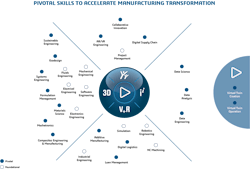Equipping the workforce of the future with sustainable skills for manufacturing transformation
By Valerie Ferret, vice president, 3DEXPERIENCE Edu, Dassault Systèmes
Sustainability is now a key business-driver for manufacturers, and has created a demand for skilled workers with expertise in the latest and sustainable technologies.
One mission of our 3DEXPERIENCE Edu department is to ensure there is no mismatch between the skills to fuel tomorrow’s sustainable innovation and the ones being taught in today’s classrooms. The key disciplines and skills needed to accelerate the manufacturing sector’s sustainable transformation are evolving. At the same time, the education world is facing many challenges. The current aging workforce is retiring faster than new students are graduating, so there is an urgent need to ensure our future workers are being taught the correct skills needed to make an immediate impact in their future roles.
Dassault Systèmes recently conducted an analysis of social media conversations to better understand how manufacturing skills are being discussed and by whom. By tracking trends and performing analysis around the discussion of identified skillsets, we can better anticipate needs, fill gaps and federate our ecosystem to best prepare the workforce of the future.
Over the course of a year’s analysis, we identified significant trends around the themes of Design for Sustainability, Additive Manufacturing, Data Science, Mechatronics and Model-Based System Engineering, among many others. The full report provides insights and recommendations for harnessing enthusiasm and engagement from all actors and boosting visibility for these critical skills of the future.
So, what can be done to ensure our manufacturing sector is equipped with the innovative workforce to power its sustainable transformation? Employers must take the initiative to reskill or upskill their existing workforce with unique learning opportunities, curricula and development programs to meet the strategic initiatives needed for today’s industry. By retraining existing employees to fill new roles, companies can create and incentivize a culture of continuous learning that will be essential for success in the coming decades.
In order to highlight what those critical skills are, Dassault Systèmes has published a series of eBooks on skills. We are also developing key initiatives in our 3DEXPERIENCE Edu Centers of Excellence global program, which accelerates experiential lifelong learning by providing businesses and governments with a network of centers to develop the expertise needed for the digital transformation of industry. The program now counts 11 members, most recently: Instituto Maua de Tecnologia, a private non-profit technical university in Brazil, and L’Industreet, a technical college in France, to provide young people who have left school with training in the industry of the future field. One of the first members was Purdue University in the US, with its Composites Manufacturing and Simulation Center.
The manufacturing industry has no choice but to embrace a more sustainable future, and we must ensure that all stakeholders find new ways to communicate and collaborate about the key disciplines and skills needed for manufacturing transformation. We will continue to facilitate these discussions through social listening initiatives and skills publications, and we encourage everyone to visit 3DEXPERIENCE Edu for more insights on building the workforce of the future.
